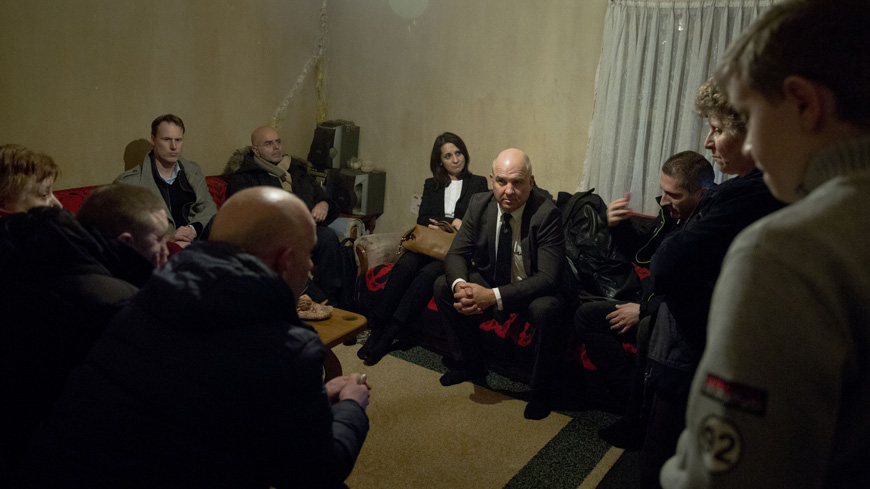“Many victims of the 1998-1999 war in Kosovo, in particular displaced persons, families of missing persons and victims of wartime sexual violence, are still trying to re-build their lives, find out the truth about their loved ones and access justice. The on-going political deliberations have not focused sufficiently on the needs of victims, leaving them with the feeling of abandonment and hopelessness. A paradigm shift is necessary in order to put the victims at the centre of the political dialogue, and prioritise their human rights,” said today the Council of Europe Commissioner for Human Rights, Nils Muižnieks, at the end of his four-day mission to Kosovo.
The Commissioner is concerned that more than 15 years after the conflict around 16 500 persons belonging to all communities remain internally displaced in Kosovo, while some 20 000 displaced persons from Kosovo to Serbia have not yet managed to return home despite their wish. About 470 displaced persons are accommodated in 29 collective centres throughout Kosovo, including the collective centre “Samacki dom”, in northern Mitrovica, that the Commissioner visited. Commissioner Muiznieks is gravely concerned about the substandard living conditions of 50 displaced persons, including children, who have been accommodated there for many years. “No one should live in such conditions in Europe today. This and other collective centres need to be urgently closed and durable solutions should be found. Moreover, adequate and safe conditions for sustainable return and integration of displaced persons should be created.”
In this context, the Commissioner underlines the importance of systematic recording and effective investigation and prosecution by the authorities of hate crime, notably on ethnic grounds, which prevents many displaced persons from enjoying their right to return. The Commissioner finds it encouraging that the number of displaced Roma lacking personal identity documents has decreased, notably due to co-operation between Kosovo and Montenegro, and encourages the authorities to continue addressing this issue in order to ensure that no Roma is left stateless or at risk of statelessness.
Families of some 1 660 missing persons still wait to find out the truth about their loved ones who remain missing and to receive justice. The process of establishing the truth has slowed down while there is a need to enhance domestic forensic expertise, increase regional co-operation, and ensure access to archives which may hold information that could help locate the remains of missing persons. The lack of effective prosecution of serious human rights violations committed during the war has exacerbated the suffering of victims and their families and the feeling of injustice which seriously hampers reconciliation efforts and the return of displaced persons.
The inclusion of women victims of wartime crimes of sexual violence in a 2014 law which provided for benefits for certain categories of war victim is an important step forward that the Commissioner welcomed. He stresses, however, the importance of establishing a comprehensive reparation programme that would ensure effective access to employment, health care and education, and help these women overcome their fear and the social stigma.
The Commissioner regrets that the Inter-Ministerial Working Group on Dealing with the Past and Reconciliation, which operated since 2012, has not produced any concrete results. He hopes that the lessons learned from this process will help the authorities address the issues of transitional justice with more commitment and in a more systematic manner, while ensuring that the voices of all victims are heard in any future relevant process.
Stressing the important role that media freedom plays in a democratic society, the Commissioner highlights the need for the authorities to effectively address and investigate all reported cases of attacks and threats against journalists, which have a serious chilling effect on journalism. The Commissioner urges the authorities to establish a sustainable, appropriate and transparent funding of the public service broadcasting organisation and to secure its editorial independence and institutional autonomy. At the same time, the Commissioner underscores that journalists have to uphold the principles of ethical and professional journalism and that self-regulation needs to be improved, in order to ensure that unethical reporting does not lead to or exacerbate the existing socio-political tensions.
Lastly, in the Commissioner’s discussions in Pristina many interlocutors raised concerns about serious shortcomings in the domestic judicial system, such as excessive length of proceedings and lack of expertise in addressing hate crime. Urgent measures are necessary to redress this situation, especially given that domestic courts are taking up more responsibilities, including in the field of wartime crimes. Having been informed of important forthcoming legislative and institutional reforms in this field, the Commissioner urges the authorities to draw upon the rich expertise of the Council of Europe and its expert bodies, such as the European Commission for Democracy through Law (Venice Commission).
A memorandum on the mission is forthcoming.
* All reference to Kosovo, whether to the territory, institutions or population, shall be understood in full compliance with United Nations Security Council Resolution 1244 (1999) and without prejudice to the status of Kosovo.



